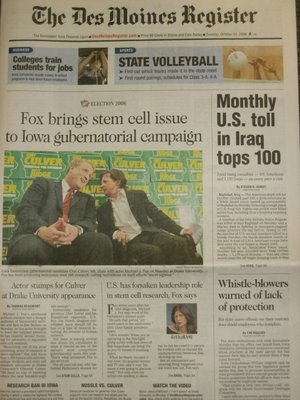Iowa's Republicans just got stomped from the top of the ticket to the bottom. They got whipped by Chet Culver,
which is like losing a foot race to a grandma pushing a walker. It's just so embarrasing, Iowa's Republican leaders look like Dan McCarney trying to explain how the Cyclones can lose to Colorado. There's just not much you can say.
I don't think it's the end of the world. It's healthy to occasionally have changes of control politically, because any party that has power too long seems to inevitably get flabby and corrupt. I don't think Chet and the Democrats will be good for Iowa, but the Republicans haven't exactly been covering themselves with glory either.
So what should the Republicans do?
Krusty thinks they should be more Konservative;
Mr. Sporer thinks they should rebuild from the ground up.
State 29 thinks they should find something to stand for besides "responsible Republican alternatives."
Maybe they're all right. I'm not smart enough to tell the Republican party what it would take to get people to vote for them. If I ran for office, I might not be able to get my wife to vote for me. Actually, I know I wouldn't, because she'd probably dump me for being demonstrably insane, and then insist I keep my full-time job so I could make my alimony payments.
While I can't tell the Republicans how to win, I can tell them how to make me care again whether they do.
NEWS ITEM: A Council Bluffs candidate for the Iowa house had this
stirring battle cry:
The second tier is generally program and incentive driven. I support the Values Fund and believe it will continue to create and attract high paying jobs. Tax Increment Financing is also an effective program that allows cities and counties to attract businesses by helping pay for necessary infrastructure. Also, small business development centers help existing and new businesses grow in the state.
The sad thing: this candidate who says the government can grow the economy by taking money from some taxpayers and businesses and giving to their competitors is the
Republican. Throw in my local Republican Senate candidate (Dan Clute) weighing in against "Big Pharma" in a leaflet left at my house, and we barely need Democrats. If only Democrats run, Democrats are probably going to win.
Since the Branstad days Iowa has been trying to grow the economy with high taxes, tax credits, gambling and, especially lately, ethanol. As ethanol only is an "industry" thanks to federal subsidies, it's basically an economy on the dole. Our economic policy debates in Iowa are just detached from reality, like a couple on food stamps arguing over whether they should buy a Lexus or a Cadillac, based on their plans to win the lottery.
So how do they get me excited about electing statehouse Republicans?
Promise to lower tax rates, end the futile corporate income tax, and get the government out of the business of allocating investment capital. This means no research credits, no ethanol credits, no historic building credits, no venture capital credits, no tuition credits, and an individual top rate no higher than 4%. You say that that doesn't raise enough money to finance government? Then...
Shrink Iowa's government. Iowa delivers government services with the same structure that it has had 100 years ago. Does any business operate that way? Go to 10-15 counties; we sure don't need 99. Force more school consolidation. Stop squandering money on convention centers, stadiums, and the like. And maybe trim duplicated programs at the state universities. What about our "unmet needs?" If jobs are going begging in Iowa, like the Register keeps telling us, any such needs aren't likely things the state of Iowa will be very good at fixing.
What about social issues? Don't bother with abortion, stem-cell research, and the like. That's above the pay grade of anybody at the statehouse. Gay marriage? Feh. We have too much work to do to argue about it.
I would like to see them look for ways to empower people and to get the government out of peoples hair. Give parents vouchers to send kids anywhere to school, as long as they can get them there. Make school districts compete for their students, and make it possible for parents to get educate their kids the way they see fit. If they want to home-school, or send them to Dowling, or send them to a new school, let the parents decide. And if they want to try college early, don't make them waste time high school. If a kid gets a perfect grade on her ACT as a junior, let her take classes at ISU, or MIT, for that matter, if she doesn't care to hang around for the senior prom, and let her use her voucher to pay for it.
Oh, and roll back drug laws. We spend a lot of money keeping drug users in jail. Let them pay their own keep on the street. It's only our problem because we make it our problem. Use the space for people who are a danger to others, like drunk drivers and child predators. If the sex offenders really can't be trusted to be within 2000 yards of a school (another stupid law), they shouldn't be out in the first place.
What other stuff would follow from this approach? No
county-owned casinos or
city-owned sports bars. No
state-owned liquor wholesalers. Forbid red-light cameras or speeding cameras in Iowa. Allow High speed-limits on four-lanes. No
restrictions on spinner hubcaps and no
"adult entertainment" taxes. (Update: and none of this
state as lifestyle police garbage either).
This I could fight for. It's a platform that would get my vote, if nobody else's. I wouldn't be too surprised, though, if it actually proved popular. And it's not like they're winning now by trying to out-pander the Democrats. Who knows? A principled stand for freedom and growth might actually be be popular.





















 The CIETC scandal just gets better. It even has caused one of Iowa's U.S. Senators to have a Sam Mack moment.
The CIETC scandal just gets better. It even has caused one of Iowa's U.S. Senators to have a Sam Mack moment.